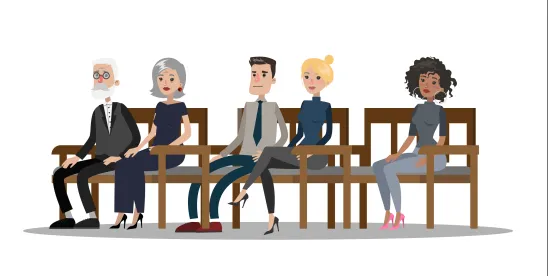In a perfect world, counsel can accomplish many goals during voir dire—but when a judge puts a strict clock on the process, those goals quickly narrow. Whether you have 15 or 45 minutes, or some amount to be determined, only proper preparation and a critical eye toward your best lines of questioning will help you reap the most benefits. Here is what we recommend:
1) Run Some Reconnaissance
When preparing to assist a trial team with jury selection, we first check whether our team has encountered that judge before and can speak to their jury selection procedures. If not, we encourage the attorneys to gather as much intel as possible, because those procedures can vary significantly from court to court and venue to venue. After all, the judge is the master of their courtroom universe and establishes their own rules and preferences for the jury selection process.
What you do not want is to use any precious voir dire time reacting to procedures you did not prepare for beforehand. Wherever it comes from, knowledge is power for attorneys conducting voir dire—a critical tool to reduce the stress and unpredictability of the situation.
In addition to the logistics of how the jurors are seated and questioned, try to find out the parameters the judge will place on the voir dire process. While some judges seem to give attorneys a wide berth in the types of questions permitted, others have more stringent views, restricting not only what you can ask potential jurors but often for how long. It is not uncommon for judges to allocate a set amount of time for each phase of voir dire, such as initial questioning by the attorneys, follow-up questioning, and challenges. If you are aware in advance, then you know you probably will have to trim some questions from your list and build out only your most promising challenges.
2) Skip the Frills
Demographics
Attorneys often want to ascertain demographic information, thinking this is the most reliable way to determine which juror(s) to deselect. However, decades of experience tell us that people are more complicated; demographic information tends not to be a reliable predictor of a juror’s proclivity to favor one side over the other. Furthermore, focusing on demographics encourages stereotyping, which may lead to erroneous jury selection decisions. Avoid assumptions that all those of a certain cultural background, college degree, or profession will necessarily be a bad—or good—juror for your case.
Positive Impressions About Your Case/Client
Do not do the opposing side any favors. Stay away from questions that could elicit favorable responses to your case themes or positive views jurors hold for your client, their products/services, etc. You might even think you are teeing up your themes in advance, getting a head start on your opening statement.
But whether by accident or on purpose, encouraging these kinds of positive responses serves only to signal the opposing side which jurors are low-hanging fruit for effective cause challenges or key targets for peremptory strikes. Know when to stop the inquiry of a juror you suspect is good for you, lest you walk them down the primrose path to being an easy strike.
Answers You Already Have
It may sound obvious, but pay close attention to any questions the judge, opposing counsel, or supplemental juror questionnaire (if any) has already asked. There is no time to duplicate efforts, and while judges generally discourage it, they may just permit you to fritter away your minutes by asking for information you have already received. So, make sure your team is alert and nimble, keeping an active checklist of what has been covered and what you still need to know.
3) Stick to What Matters Most
When you find yourself with less time than is ideal, try to enter the courtroom with a sense of the skippable questions on your list and which issues demand special attention. A juror risk profile will be your best friend in this regard, but as a rule, questions that get at jurors’ most case-relevant attitudes, beliefs, and experiences tend to be the most predictive of their leanings.
Attitudes and Beliefs
People’s opinions are far better indicators than their demographics, so ask questions that invite dichotomous responses and could uncover hostility toward your side (e.g., “Who here believes that any exposure to a toxic chemical will eventually lead to some sort of illness?”). When crafting your list, remember that this is jury de-selection. You want to know who will be predisposed against your case to strike them from the panel, and unfortunately, time limitations make it difficult to meander through open-ended questions. Have a consultant or colleague make note of those jurors with unfavorable responses for you to reference when weighing strike options.
Additionally, consider asking questions to the entire jury pool to save time, with a focus on uncovering strong beliefs. If a question gets hand raises from half the panel, that does not help you much, so phrase your questions such that only the few who hold the most extreme viewpoints will reveal themselves. Use follow-up questions sparingly—primarily as a path for a cause challenge or to elicit that last kernel of information that can help you make a strike decision.
Life Experiences
Another useful predictor of juror leanings is their life experiences. When representing the defendant, identifying any juror experiences similar to those of the plaintiff can be particularly revealing, such as personal injuries, working conditions, or negative encounters with a corporation. In employment discrimination matters, this might include questions about whether a juror has ever been (or felt) discriminated against. A case involving a car crash or car manufacturer often necessitates questions about driving habits, recalls, and accident histories. Just note that while banking on resemblances to a party can be useful in a pinch, juror-litigant similarity is a nuanced issue.
4) Hire a Jury Consultant
Most litigators only go to trial a few times a year, if at all. Their experience conducting voir dire is limited to that pace, whereas a seasoned jury consultant has been involved in hundreds of jury selections across a wide variety of case genres and trial venues. Most also have conducted countless jury research projects and developed an understanding of what jurors find most important in each type of litigation, as well as which beliefs and experiences can influence their views of your case.
Conduct Jury Research and Leverage Juror Profiles
Jury consultants ask extensive questions to all research participants—typically more than 100 in the background survey alone. By comparing that information through statistical analysis of the strongest plaintiff and defense supporters at the jury research project, we can develop a robust risk profile and tailor your voir dire strategy.
Whether they are derived from jury research or jury consultants’ experience with your venue and case type, juror profiles provide insight into the key questions to pose in voir dire and make question planning much easier. Consultant expertise is particularly valuable during limited voir dire; having encountered thousands of potential jurors, our team has an arsenal of quick, effective questions to ferret out those who will never “hear” your case.
Run Social Searches
We always recommend social media research of the jury pool to uncover beliefs and biases you might not otherwise have the time to discover in voir dire, as well as pinpoint specific jurors and topics to focus on during questioning. Even when you do not receive the jury list until voir dire is about to begin, a fast and competent team performing social research in the background can be enough to flesh out jurors in the box and make rapid keep-or-strike decisions.
In Conclusion
Trial attorneys with little time for voir dire must prioritize—above all else—the lines of questioning that will quickly identify jurors whose attitudes and biases do not align with their client or case. This information establishes a foundation for using cause challenges and peremptory strikes against the most dangerous jurors. With smart planning, strategic research, and a tight question list, you can still be confident in the seated panel despite a limited voir dire process.




 />i
/>i

